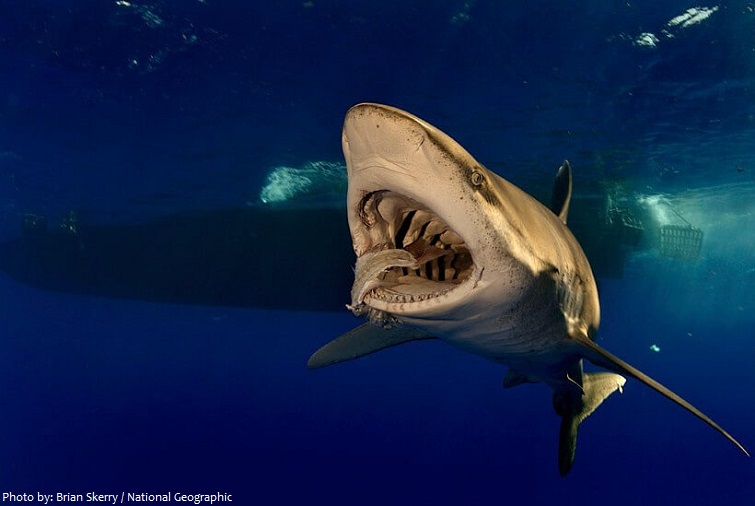
Let’s kick off SharkFest 2023 with two special guest lecturers for our Red Carpet Event – paleobiologist Dr. Bretton Kent, currently Principal Lecturer Emeritus at the University of Maryland, College Park, and Lucy Howey, a shark researcher at Exeter University currently concentrating on the oceanic whitetip shark.
Dr. Kent’s focus for his research is the Calvert Cliffs fossil beds on the western shore of Chesapeake Bay. His lecture, titled “Biology on the Beach: The Spectacular Sharks of Calvert Cliffs,” will discuss these world-renowned cliffs known for producing a remarkable diversity of Miocene shark fossils. This diversity reflects two fundamental changes in Miocene shark communities; the diversification of a surprising array of giant sharks and a near-total restructuring of lifestyles among smaller sharks. In this talk, we will examine these interrelated changes and how they collectively produced the highly diverse shark fossil communities found in Calvert Cliffs.
Brett Kent received his Bachelor’s and Master’s degrees in Zoology from Oregon State University and his Ph.D. in Zoology from the University of Maryland. His research focuses on the diversification of elasmobranchs (sharks and rays) during the Neogene (23.3-2.6 million years ago), with a special interest in the complex of giant sharks from this period. He is best known for his work reconstructing the dentition and paleobiology of the extinct false mako shark (Parotodus) and the paleobiology of the extinct giant thresher sharks (Alopias). His research has also included work on the development, evolution, and paleobiology of the megatooth shark (Otodus megalodon). Much of his work has concentrated on the Calvert Cliffs fossil beds in Maryland. He has written two books and a chapter for the Smithsonian on these sharks and rays, including the description of a new species of giant thresher shark. His current research is concerned with more fully documenting the incredible diversity of fossil sharks and rays in the Calvert Cliffs beds.
Lucy Howey’s current work in sharks revolves around her Ph.D. work with the oceanic whitetip shark. Her talk will discuss the results of this decade-long endeavor and examine the complex and fascinating migrations of this
endangered pelagic species in the North Atlantic and the multilateral ways that humans are conserving and threatening the species throughout its range. Oceanic whitetip sharks (Carcharhinus longimanus) have a reputation for being tough and resilient animals. They survive in low-oxygen environments and tolerate a wide range of water temperatures. Millennia of evolutionary history has provided them with elongated, airplane-like pectoral fins to cruise at low speed and maneuver effortlessly while covering vast distances in the challenging conditions of the harsh environmental desert of the open ocean. Migratory routes are long (thousands of kilometers each year), solitary, and segregated – adult males and females undertake unique migrations exposing themselves to unique risks. However, the impressive adaptations that have undoubtedly contributed to their success as an oceanic species, now expose them to heightened risks in a human-governed ecosystem littered with political threats such as fishing fleets, development, and jurisdictional boundary disputes. Even though the species is evidenced throughout the fossil record and successfully survived millennia, growing pressures throughout the last century and coinciding with industrialized fishing have caused a rapid and serious (~90%) decline in populations. In response to these alarming population trends, in 2010 their research team launched an ambitious project using satellite tracking, ultrasound scanning for pregnancy, and stable isotope analysis to gather as much biological information regarding the species and its behavior as possible.
Lucy Howey is a Maryland native and her curiosity about sharks began while collecting fossilized teeth from the diverse shark populations that once inhabited this area. She continued her apex predator interests, pursuing a Biology degree at Virginia Tech and a Master’s in Marine Biology. Lucy is currently working on her Ph.D. focused on oceanic whitetip sharks at Exeter University and holds an MBA from Johns Hopkins University. Lucy is broadly interested in the biological and human-derived processes and systems that govern shared resources, in particular, migratory shark species that undergo complex and multi-jurisdictional migrations. In her research, Lucy uses animal tracking through electronic telemetry, fosters relationships with local fishers and communities, and computational modeling. Lucy has authored and co-authored over thirty scientific publications on the ecology of various species of shark. Her work has been featured in National Geographic, Smithsonian, and Outside magazines, and has appeared on the BBC and Discovery Channel’s Shark Week. She has studied sharks throughout the world, including New England, the Caribbean, and the South Pacific.
Spaces are limited. Doors open at 6 pm. Mingle, enjoy refreshments, and wander through the SharkFest displays. The speakers will begin at 6:30 pm with a brief intermission between each speaker.